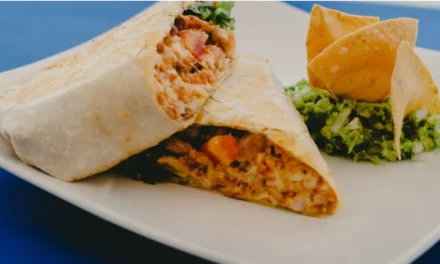Greggs is the immensly popular UK bakery chain known for its wide range of baked goods and snacks, from the iconic sausage rolls to sandwiches, pizzas, sweet treats, and breakfast favorites. But the pressing question for many Muslims: is Greggs halal? Do the ingredients, preparation methods, and handling procedures adhere to Islamic dietary laws?
With over 2,000 store locations nationally, Greggs serves an estimated 6 million customers per week across nearly every corner of Britain. The accessibility and indulgence of Greggs have cemented its status as a cultural icon. Greggs even emerged as the unexpected winner of 2019’s much-coveted “Vegan Sausage Roll Wars” between bakery chains.
But does Greggs’ mass appeal also extend to Britain’s 3 million halal consumers? Can devout Muslims safely enjoy these beloved meat-filled rolls, sandwiches, and pies without compromising their religious values? Uncovering definitive answers requires an in-depth exploration of Greggs’ inner operations.
Demystifying Halal Food Standards
Interpretations of whether food meets halal standards per Islamic law can vary significantly depending on individual viewpoints and schools of thought. But several core principles around permitted and prohibited ingredients outlined in Muslim or Quranic guidelines remain consistent:
Permitted Meat Sources
- Cows, sheep, goats, chickens, ducks slaughtered through zabiha ritual without pre-stunning
- All animals must be well cared for throughout lives with methods focused on minimizing stress and suffering
Prohibited Meat Sources
- Pork or pork byproducts
- Carnivorous animals like dogs, cats, lions and bears
- Animals slaughtered incorrectly by non-Muslims (such as typical mass production methods)
Permitted Non-Meat Foods
- Fish with scales
- Vegetables, fruits, nuts, grains
- Dairy products like milk, butter and cheeses only from halal-certified sources
Prohibited Foods
- Alcohol including wine, beer and liquor
- Foods containing blood or blood byproducts
- Pork enzymes, gelatin, additives
- Cross-contamination from non-halal sources at any point from farm to table
Why Certification Matters
For a restaurant or food producer to unequivocally market products as “halal,” they must adhere precisely to all protocols around ingredients, supply chains, facilities and procedures. Organizations then submit to third-party halal certification bodies like the Halal Food Authority (HFA) for stringent auditing and monitoring on an ongoing basis.
The certification process extends far beyond just avoiding bacon or alcohol too. Equipment that handles haram items cannot touch halal foods without thorough cleaning. Storage areas must remain fully segregated. Food prep workers need proper halal training as well. The entire lifecycle of bringing nourishment from farms to families requires an almost fanatical level of oversight and discipline.
When official certification proves elusive, as with Greggs, determining true halal compliance chains becomes complex and ever-evolving. Diving into the specifics of Greggs’ supply network illuminates the current reality for Muslim consumers.
Is Greggs Halal Certified?
As of 2023, Greggs retains no formal halal certification through accredited agencies like HFA or JAKIM. Greggs’ Customer Service team confirms the lack of certification across UK bakery locations:
“Like many other brands, we care to ensure our recipes are produced in a way that avoids the abuse or exploitation of animals. All of our UK shops are very small with limited display space so we try to offer food that will appeal to as many customers as possible rather than specific ranges.”
Greggs’ priority remains broad appeal across diverse communities, not catering to particular dietary lifestyles. Their limited retail footprint also constrains extensive customization. Small shops baking goods from shared equipment and supplies cannot readily isolate specific halal production.
Yet this blanket corporate stance requires nuance around individual menu items. Certain offerings hold higher innate likelihood of incidentally aligning with halal laws.
Which Greggs Foods Are More Halal-Friendly?
With over 1,500 products available across hundreds of shops at any given time, providing definitive halal status for Greggs items proves improbable without certification. Seasonality, supply fluctuations and creative new concoctions like the renowned Vegan Sausage Roll further complicate matters.
However, customers can assess options to estimate compliance:
Breads and Baked Goods
- Plain rolls, baguettes and sandwich wraps
- Sweet bakery items without non-halal additives
- Muffins and doughnuts not containing pork enzymes or gelatin
Bread holds cultural importance in Islam with religious roles dating back to Prophet Muhammad. Traditional Islamic guidance prefers making breads solely with water, flour, salt and olive oils. Greggs lard-glazed treats obviously violate restrictions. But their classic baguettes, rolls and several sweet snacks could potentially qualify as halal.
Salads and Sandwiches
- Vegetable-only salads
- Sandwiches with certified halal chicken, beef or lamb
Staples like lettuce, tomatoes, onions and cucumbers or sandwiches featuring halal meats could offer safe, nutritious picks for Muslims seeking hot food-on-the-go. However, scrutiny remains vital checking labels and asking questions to validate supply chains.
For example, superficially innocuous ingredients like cheese or dressings could derive from non-halal sources depending on brand partnerships. If the sourcing proves untraceable, better to avoid potential impermissible ingredients altogether.
Savory Pastries
- Vegetable or cheese pastries
- Sausage rolls or steak bakes with halal meats
Greggs offers an immense selection of hot, portable savory snacks from familiar meat pies to pizza twists. Obviously pork sausage rolls automatically violate halal doctrine. But pasties or other treats free from alcohol or questionable enzymes could suit Muslim needs if made with confirmed halal ingredients.
When Islamic standards align across an entire supply chain, even notoriously haram products like pepperoni pizza can earn halal certification. For Greggs though, ambiguity persists around many beloved hot snacks without third-party auditing.
Drinks
- Soft drinks
- Bottled water
Beverage choices offer additional simple halal picks. Mass-produced soft drinks and water avoid forbidden ingredients like carrion, blood or alcohol. But some Muslims abstain from “non-natural” fizzy drinks too. Once again, personal interpretations of compliance vary.
Why the Greggs Supply Chain Complicates Halal Hopes
Greggs’ sprawling manufacturing and distribution infrastructure perhaps poses the greatest barriers to viable halal offerings currently:
- 2,050+ retail bakery shops with limited floor space
- 10 bakery factories supplying all locations
- 500+ ingredient types from numerous suppliers
- 300 distribution route trucks delivering daily
This vast network churns out over 8 million items weekly from sandwiches to cookies to meals. But such intensely mass-produced food courts risks around cross-contamination. While Greggs strives for responsible animal welfare and ingredient transparency through supply partners, they make no religious claims:
“We work with suppliers who share our values and high standards. But we can’t legally describe any of our products as being ‘halal’ or ‘fit for Muslims’ because we don’t have halal accreditation.”
The struggle stems from industrial capacity outpacing specialized oversight. Securing halal-only facilities and sanctuary status requires substantial investment reconfiguring processes built for efficiency, not purity. Greggs maxes out existing infrastructure crafting crowd-pleasers like the Mexican Bean and Sweet Potato Enchilada.
Small menu tweaks that please the masses hold sensibility over chasing niche markets absent sustained demand. As Muslim consumer desires evolve though, Greggs pays heed:
“We try to offer food that will appeal to as many customers as possible – but we are continuously looking at what our customers are asking for.”
Appealing to Britain’s growing Islamic demographic may gradually attract more consideration.
How Other Chains Cater to Halal Customers
Several UK food chains demonstrate the helpfulness…and hindrances…around fast food pursuing halal certification given today’s industrialized systems:
Subway – Selected branches boast halal meats, chicken and ham meeting HFA standards. All halal items display clear in-store signage. However, sharing workplace real estate alongside non-halal subs requires vigilant protocols preventing cross-contamination.
KFC – Some KFC locations provide hand-slaughtered chicken from accredited suppliers when inventory allows. But recipes, prep and sourcing inconsistencies across nearly 900 UK stores complicate reliable access. Customers must verify options at their particular restaurant.
Nando’s – Certain Nando’s restaurants sell verified halal chicken straight from HFA audits. Red and green sticker systems help avoid contamination between conventional and Islamic prep areas. Yet scaling broad availability for their signature PERi-PERi marinade remains an obstacle.
McDonald’s – The world’s foremost burger giant offers McAloo Tikki sandwiches, HFA chicken nuggets and vegetable burgers to satisfy halal meat restrictions in South Asian markets. But current supply realities prevent such inclusive menus reaching across European and American territories.
Delivering authentic, consistent halal fare through mass franchising and processing channels constitutes an ongoing challenge requiring sustained effort.
Ordering Halal-Friendly Options at Greggs
Since Greggs holds no official halal certification presently, customers assume responsibility validating food standards to their personal thresholds by:
- Inquiring with staff about recent equipment sanitize timing, storage protocols and kitchen conditions
- Requesting holistic ingredient supply chain information from leadership when still unclear
- Double-checking packaging labels extremely carefully for any alcohol, questionable enzymes and cross-contamination risks
- Considering best timing for visits during slower business periods when halal caution more plausible
- Custom formulating sandwich spreads, breads and salad bowls from confirmed permissible components
Of course, policies and practices fluctuate store to store. Franchise owners may overlook procedures as rush hour demand spikes for breakfast pasties and coffee. What suffices as compliant to one Muslim Greggs customer may not satisfy stricter adherents to ancient zabiha traditions. Individual discretion inevitably determines dining decisions pending the certainty that full halal remains beyond Greggs’ current grasp.
For devotees seeking foolproof compliance, chains with formal halal administration offer reliable alternatives for now. But Greggs’ honest efforts around ethical ingredients offer hope.
The Forecast: Will Greggs Ever Go Fully Halal?
In 2013, Greggs CEO Roger Whiteside first acknowledged considering halal certification to appeal to Britain’s surging Islamic population:
“It’s an interesting situation and I’m very aware of the politics of it. I’ll be guided by what customers ask me for.”
Nearly a decade later, Whiteside and Greggs remain cautious around stirring accusations of religious favoritism by chasing Muslim markets absent sufficient organic demand:
“At the moment we try to offer some halal products but it would be very difficult to have segregated preparation areas.”
However, Gregg’s recent boom accelerating from 1,500 locations in 2008 to over 2,000 today suggests the chain continues branching into new communities. Catering to modern diversity spurred Gregg’s popular Vegan Sausage Roll too.
If Muslim consumer voices grow louder for halal options as demographic data forecasts, Greggs possesses the leadership wisdom and operational know-how to meet changing societal needs. Pursuing full-fledged certification constitutes more an issue of measured timing aligned with public readiness rather than any institutional resistance.
Past decades witnessed Gregg’s shrewdly ride evolving consumer health trends from avoiding trans-fats to reducing sugar. Their next chapter courting religious inclusivity seemingly inches closer on the horizon year-over-year as cultural integration initiatives progress across Britain.
Conclusion
In final analysis, Greggs remains a widely beloved brand amongst Brits of all creeds thanks to an intentionally broad appeal. Yet without formal halal administration, Muslims bear personal duty vetting menu items case-by-case when gravitational pulls steer hungry patrons through those familiar doors.
Some products hold decent chances as incidentally halal pending ingredient details. But the casualness of industrial mass production allowing trace alcohol or pork bits to inadvertently mingle into recipes prevents a perfect score for strict adherents. Not from any malice, but practicality.
Still, Greggs‘ history adapting to meet evolving societal tastes hints their future likely involves warmer welcomes for halal faithful in good time. Leadership understands their special stewardship guiding UK eating habits.
Similar to the gradual mainstreaming of veganism through clever menu innovations in recent times, seedlings of Islamic inclusion continue sprouting at Greggs. Signs point to bigger harvests in coming years aligning corporate supply flows with deepening diversity.
For now, consumers seeking flawless halal guardrails may prefer other conscientious chains. But for Muslims with more flexibility around modern contexts, Greggs’ offerings put the possibility of permissible items within reach…especially when grabbing that tasty Vegan Sausage Roll.
Frequently Asked Questions – Is Greggs Halal
Greggs cannot label their products as halal because they don’t guarantee that all their products are halal. They use a range of suppliers and can’t ensure that all the ingredients used are halal.
Does Greggs offer vegetarian options?
Yes, Greggs does offer a range of vegetarian options including cheese and onion pasties and other vegetarian pastries.
Q: What is Greggs’ stance on using cookies?
A: Like many brands, Greggs’s website uses cookies to provide users with a better experience. They have a privacy policy that provides information on the use of cookies.
Q: Can I find Greggs outlets that offer healthier options?
A: Yes, some Greggs outlets offer healthier options, including free-range and vegetarian items, in response to requests for specialist ranges.
Q: How does Greggs ensure the privacy of its customers?
A: Greggs takes customer privacy seriously and has a privacy policy in place to ensure the protection of their customers’ information.
Q: Are Greggs’ products halal or haram?
A: Greggs products cannot be labeled as halal or haram as they cannot guarantee the status of all their ingredients and products due to the use of a range of suppliers.
Does Greggs use stun abu in their products?
Greggs cannot guarantee that stun abu is not used in their products due to the use of a range of suppliers.
Can Greggs accommodate requests for specialist ranges like halal or vegetarian products?
Greggs does get requests for many specialist ranges, including halal and vegetarian products, and they try to offer the food customers want where possible.
Does Greggs offer onion pasties?
Yes, Greggs offers a variety of pasties, including cheese and onion pasties, for their customers.





